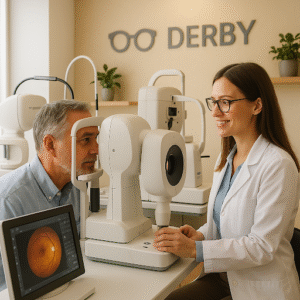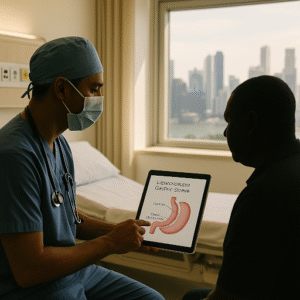
Finding the best NHS eye examination Derby means knowing eligibility, local providers, and what the exam will cover. This guide explains the NHS process, what happens during the test, local options in Derby, and next steps if a problem appears.
- TL;DR: Many people qualify for a free NHS eye test; bring ID and proof of eligibility; expect vision checks, retinal imaging, and referrals if needed.
- Digital retinal imaging and OCT are common in top Derby practices such as
- Diabetic screening and hospital referrals follow clear NHS pathways across Derbyshire—see NHS guidance for details.
NHS Eye Test Eligibility & Process
What qualifies me for a free NHS eye test in Derby?
Summary: You qualify if you meet NHS eligibility criteria like age, income, or medical conditions.
Definition: An NHS eye examination is a government-funded health check for vision and eye disease detection. Examples of qualifiers include being under 16, over 60, on certain benefits, or diagnosed with diabetes. Check the NHS page on visiting an optician for the full list: NHS visiting an optician.
What documents do I need to bring to my NHS eye test appointment?
Summary: Bring photo ID and proof of eligibility or benefits.
Examples: A driving licence, passport, or a benefits letter works. If you have an NHS optical voucher, bring that too. Stores like accept these documents and will confirm eligibility at booking.
How often can I have an NHS-funded eye examination?
Summary: Most eligible adults get a free test every two years; some conditions require annual checks.
Definition: NHS policy usually funds tests every two years for eligible people. People with diabetes, glaucoma risk, or recent eye disease may qualify for yearly checks or more frequent monitoring.
What to Expect During an NHS Eye Examination
What happens during an NHS eye test in Derby?
Summary: The test checks vision, eye health, and future care needs.
Process: The optometrist measures visual acuity, tests for refractive error, checks eye movements, and examines internal eye structures. They discuss symptoms and medical history. Expect advice on spectacles, contact lenses, or referrals.
Will digital retinal imaging be part of my NHS eye examination?
Summary: Many Derby practices now include retinal imaging as standard.
Definition: Digital retinal imaging captures photos of the back of your eye. It helps detect early signs of disease and creates a baseline for future checks. Top local clinics use OCT and retinal photography for more detailed assessment, which improves early detection.
How long does a typical NHS eye test take?
Summary: Plan for 20 to 40 minutes for a standard NHS eye test; longer if imaging or dilation is needed.
Examples: Routine tests average 20 minutes. If you need pupil-dilating drops, add 15 to 30 minutes for the drops to take effect and for imaging.
Local Services and Quality of Care
Which opticians in Derby offer the best NHS eye examination?
Summary: Choose practices that combine clinical skill with modern imaging.
Examples: Independent practices and national chains offer NHS tests. Optique Derby stands out for patient referrals and advanced imaging technology. Check local listings and patient reviews when choosing.
How do NHS eye tests differ from private ones in Derby?
Summary: NHS tests focus on health and eligibility; private tests can include extra screening and faster service.
Comparison: NHS exams follow a standardized health-first protocol. Private exams often add extended imaging, longer consultations, and bespoke management plans. If you want more detailed imaging, ask about private add-ons during booking.
Are there any innovative diagnostic technologies used by Derby opticians?
Summary: Many Derby clinics use OCT, digital retinal photography, and electronic referral systems.
Examples: Optical coherence tomography (OCT) gives cross-sectional eye scans. The Midlands Electronic eyecare Referral System speeds referrals to hospital eye services. These tools improve detection and referral accuracy. For local screening programs, see Derbyshire County Council: Derbyshire NHS screening.
Special Conditions & Referral Pathways
What additional screenings, like diabetic eye screening, does the NHS offer in Derby?
Summary: The NHS provides targeted diabetic retinal screening on top of routine eye tests.
Definition: Diabetic screening captures retinal images to check for retinopathy. Appointments typically last 20 to 30 minutes and use dilating drops when needed.
How do NHS referrals to hospital eye care work in Derbyshire?
Summary: Your optometrist refers you via local electronic systems for specialist review.
Process: If an issue needs a specialist, your optometrist sends a referral. The Midlands electronic system often speeds triage and appointment allocation.
What should I do if my NHS eye test finds an eye health issue?
Summary: Follow the optometrist’s advice and attend any booked referrals promptly.
Tips: Keep records of your test, accept recommended imaging, and attend follow-ups. Early treatment improves outcomes for conditions like glaucoma and macular disease.
Summary:
The best NHS eye examination Derby combines clear eligibility guidance, skilled clinicians, and modern imaging. Bring ID, expect vision and retinal checks, and follow up quickly if your optometrist recommends referral. For local bookings and detailed services, visit Optique Derby and NHS resources linked above.
FAQ
Who is eligible for a free NHS eye test?
Most people on certain benefits, under 16, over 60, or with specified medical conditions are eligible.
Can I get retinal imaging during an NHS test?
Many Derby practices now include digital retinal imaging as part of the NHS exam or as an optional add-on.
How do I book an NHS eye test in Derby?
Contact local opticians directly or book online through their websites; bring proof of eligibility to your appointment.




